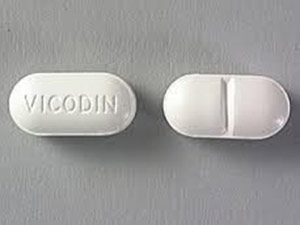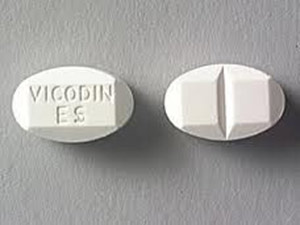Category: Buy Vicodin Online
What is Vicodin?
Vicodin is a combination medicine that contains a combination of acetaminophen and hydrocodone. It contains hydrocodone, an opioid pain medication, and acetaminophen, a non-opioid pain medication. Hydrocodone changes the way your body feels and responds to pain. Acetaminophen also helps in reducing fever. Vicodin is available in both generic and brand name versions. The brand name version comes in tablet form. The generic version comes in tablet and liquid forms. Both generic and brand-name versions of this drug are easily available. You can also order Vicodin online.
Types of Vicodin
Vicodin tablets are available in the following strengths:
Vicodin 5 mg/500 mg: It is a white, capsule-shaped, bisected tablet imprinted with a “5” and “300” on one side and “VICODIN” on the other side in bottles of 100 and 500 tablets. The usual dosage for an adult is one or two tablets every 4 to 6 hours as needed for pain. The maximum daily dosage should not exceed eight tablets.
Vicodin 7.5 mg/750 mg: It is a white, capsule-shaped, bisected tablet imprinted with a “7.5” and “300” on one side and “VICODIN ES” on the other side in bottles of 100 and 500 tablets. The dosage for adults is one tablet every 4 to 6 hours as needed for pain. The maximum daily dosage of this drug should not exceed six tablets.
Vicodin HP 10 mg/300 mg: It is a white, capsule-shaped, bisected tablet imprinted with a “10” and “300” on one side and “VICODIN HP” on the other side in bottles of 100 and 500 tablets. The usual dosage for an adult is one tablet every 4 to 6 hours as needed for pain. The maximum daily dosage of this drug should not exceed six tablets.
How to take Vicodin?
People can take this medicine by mouth as prescribed by their doctor. Take this medicine with or without food. Take this medicine with food if you have nausea. Follow all the directions given on the prescription label. If you want to buy Vicodin online, make sure that it comes with a proper prescription label and medication guidelines. Use a medication measuring device if you are using the liquid form of this medicine. The dosage of this medicine depends upon your medical condition and response to treatment. In children, the dosage of this medicine depends upon their weight. Do not increase your dose, take the medication more frequently, or take it for longer than the prescribed duration. Stopping this drug suddenly may cause withdrawal. The risk is higher in people who have used this drug for a long time or in high doses. The withdrawal symptoms include restlessness, mental or mood changes such as anxiety, trouble sleeping, thoughts of suicide, nausea, diarrhea, sweating, runny nose, watering eyes, muscle aches, or sudden changes in behavior. This drug may not be effective if used for a long time. Talk with your doctor if this medicine stops working well. This drug may sometimes cause addiction. The risk is higher if you have a drug or alcohol addiction. Do not take this drug more than recommended because it may lead to an overdose. The overdose symptoms include nausea, pain in the upper stomach, itching, loss of appetite, dark urine, clay-colored stools, or jaundice.
What to know before taking Vicodin?
Before taking this drug, tell your doctor if you are allergic to it or other opioids such as benzhydrocodone, hydromorphone, morphine, and codeine. Never take this medication if you have any other allergies. Before taking this medicine, tell your doctor if you have:
- brain disorders such as a head injury, tumor, seizures
- breathing problems such as asthma, sleep apnea, COPD
- kidney disease
- liver disease
- mood disorders such as depression
- personal or family history of substance abuse
- stomach or intestinal problems
- difficulty urinating due to enlarged prostate
- gallbladder disease
- a disease of the pancreas
Avoid using this medicine if you have used an MAO inhibitor in the past 14 days. The Mao inhibitors include isocarboxazid, linezolid, methylene blue injection, phenelzine, rasagiline, selegiline, or tranylcypromine. Vicodin may make you dizzy or drowsy. Drinking alcohol can make you more dizzy or drowsy. Do not drive or do anything that requires alertness until you can do it safely. Before having any surgery, tell your doctor that you are using this medicine and about all the products you use. Children can be more sensitive to the side effects of this medicine. Old-age people may be more sensitive to the side effects of this drug, especially confusion, dizziness, drowsiness, and slow or shallow breathing. Do not use this drug during pregnancy because it may harm an unborn baby. This drug passes into breast milk and may have undesirable effects on a nursing infant. Tell your doctor immediately if you notice side effects such as unusual sleepiness, difficulty feeding, or trouble breathing in a baby.
What are the side effects of Vicodin?
The common side effects of Vicodin include:
- drowsiness
- headache
- constipation
- upset stomach
- blurred vision
- dry mouth
Some of these side effects may disappear after you have been using this medicine for a while. You must tell your doctor immediately if any of these effects persist or worsen. Vicodin can also cause some severe side effects. These are as follows:
- lightheadedness
- unusual thoughts or behavior
- confusion
- seizure
- easy bruising or bleeding
- breathing problems such as shallow breathing, breathing that stops during sleep or sleep apnea
- infertility
- missed menstrual periods
- sexual problems or loss of interest in sex
- liver problems – nausea, upper stomach pain, loss of appetite, itching, dark urine, clay-colored stools, jaundice
- low cortisol levels, including nausea, vomiting, loss of appetite, dizziness, worsening tiredness or weakness
- high levels of serotonin in the body- agitation, hallucinations, fever, sweating, shivering, fast heart rate, muscle stiffness, loss of coordination, twitching, nausea, vomiting, diarrhea
Vicodin may cause severe breathing problems in older adults and those who are debilitated or have chronic breathing disorders. Acetaminophen can cause a severe skin reaction in some rare cases. This could occur even in people who have taken this drug in the past and had no reaction. You must stop taking this drug if you have skin redness or a rash that spreads and causes blistering and peeling. Do not take any medicine again that contains acetaminophen if you have this type of reaction.
What to avoid while using Vicodin?
This drug can interact with many other medicines and cause dangerous side effects. Tell your doctor if you use the following drugs:
- medications for motion sickness
- narcotic medications – opioid pain medicine
- sedatives like Valium including diazepam, alprazolam, lorazepam, Xanax, Klonopin, Versed, and others
- cold or allergy medicines, asthma, and COPD medication, or a diuretic
- drugs that make you sleepy or make your breathing slow – a sleeping pill, muscle relaxer, medicine for mood disorders or mental illness
- such medications that affect serotonin levels in your body, including a stimulant or medicine for depression, migraine headaches, serious infections, Parkinson’s disease, or nausea and vomiting
Some medicines can affect the removal of hydrocodone or acetaminophen from your body, affecting how hydrocodone and acetaminophen works. Some of these drugs include azole antifungals such as ketoconazole, macrolide antibiotics such as erythromycin, HIV medicines such as ritonavir, rifamycins such as rifampin, and drugs used to treat seizures such as carbamazepine, phenytoin.


